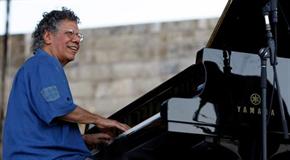Features
Corea Competes Against Himself At Grammys

Now, The 71-year-old jazz pianist and composer is in the unusual position of competing against himself in two categories at the Feb. 10 awards show in Los Angeles.
“People in the music business say don’t make too many records because they’ll compete against one another,” Corea said in a phone interview. “Well, it’s exactly what’s happening, but I’m very happy about it because what I love to do is making a lot of music.”
His album Hot House, the latest chapter in his 40-year partnership with vibraphonist Gary Burton, has three nominations – best jazz instrumental album, improvised jazz solo for the title track and instrumental composition for “Mozart Goes Dancing.”
Further Explorations, on which he pays tribute to major influence Bill Evans and is joined by Evans trio alumni drummer Paul Motian and bassist Eddie Gomez, was nominated for best jazz instrumental album and improvised jazz solo for “Alice in Wonderland.”
The five Grammy nominations bring Corea’s career total to 62, tying him for fourth place with composer John Williams for most nominations. He trails only Quincy Jones (79), Georg Solti (74) and Henry Mancini (71). Corea has won 18 Grammys, including two last year for Forever, an electric-acoustic album on which the pianist, bassist Stanley Clarke and drummer Lenny White explored the roots of their groundbreaking 1970s jazz-rock fusion band Return to Forever.
Corea appreciated the Grammy recognition for Further Explorations, one of the last recordings by Motian, who died two months before the album’s release in January 2012.
The two-CD set was recorded over two weeks at the Blue Note jazz club nearly 50 years after the release of Evans’ landmark Explorations LP. Those early Evans recordings with Motian and bassist Scott LaFaro expanded the vocabulary for modern piano-trio jazz, Corea says, by introducing “a conversational approach to playing” in which the drums and bass interacted with the piano as equals.
The album includes originals by each trio member, Evans’ own compositions and standards that Evans made his own, such as “Alice in Wonderland” from the Disney film.
“None of us wanted to just go in and try to reproduce Bill Evans trio music,” Corea said. “That’s why the concept of ‘Further Explorations’ … it was the idea of let’s explore it further.”

While Further Explorations was a onetime project, Hot House continues a duo collaboration with Burton dating back to 1972 that has included four Grammy-winning albums on which they mostly played Corea’s compositions.
To mark their 40th anniversary, the pair decided to focus on a standards repertoire for the first time with Corea writing new arrangements for music such as Antonio Carlos Jobim’s “Chega de Saudade,” Thelonious Monk’s “Light Blue” and Dave Brubeck’s “Strange Meadow Lark,” which they played early in their careers.
The Grammy-nominated title track is a composition by bebop pianist Tadd Dameron that was popularized by Charlie Parker and Dizzy Gillespie.
“When I came to New York after high school in 1959 and started to meet musicians, Hot House was like a standard jam session tune,” Corea said. “It looked like a good way to sum up the whole album … which was our roots.”
The only original tune on Hot House is “Mozart Goes Dancing,” on which Corea combined a harmonic progression familiar to Mozart with Latin rhythms. He enlisted the Harlem String Quartet to join the duo, which he says is a harbinger for future recordings.
Corea also released The Continents, a six-movement concerto for jazz quintet and chamber orchestra, last year and The Mothership Returns, a double-CD with a bonus DVD, recorded during a 2011 tour by the latest incarnation of Return To Forever.
Immediately after the Grammys, the pianist plans to stay in L.A. to mix his next album with his new acoustic-electric band, Chick Corea & The Vigil, which includes saxophonist Tim Garland as well as young musicians Hadrien Feraud on bass, guitarist Charles Altura and drummer Marcus Gilmore, the grandson of renowned drummer Roy Haynes, who played on Corea’s breakthrough 1968 trio album Now He Sings, Now He Sobs.

“The idea of The Vigil is to defy the norm of boxing you into playing music in a certain style,” Corea said. “It’s about how to keep a free mind as a musician.”